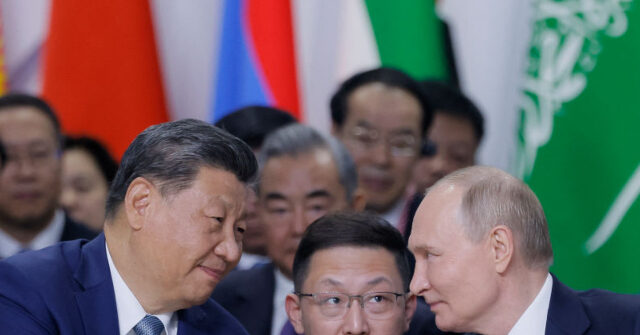Genocidal Chinese dictator Xi Jinping is expected to visit Russia on May 7, both the Chinese and Russia governments confirmed on Sunday, to attend celebrations marking the anniversary of the end of World War II.
Xi, the Chinese Foreign Ministry detailed, is expected to stay in the country through May 10 and engage in private meetings with Russian strongman Vladimir Putin and sign joint agreements with Moscow. The visit will mark the first in-person interactions between Xi and Putin this year; the two most recently met at the 2024 BRICS summit in Kazan, Russia, in October.
While neither of their governments disclosed the anticipated topics of conversation in detail, both are expected to address the top political issues facing each one: for China, the imposition of onerous tariffs on its exports by the administration of President Donald Trump; for Russia, Putin’s stalled negotiations with Washington intended to resolve Russia’s invasion of Ukraine.
The Russian government will mark the end of World War II next week with festivities intended to highlight the defunct Soviet Union’s role in defeating Nazi Germany — and dramatically underplay the instrumental role the United States played in defeating the Nazis and Imperial Japan. Moscow is planning a parade featuring a host of VIP guests, Xi paramount among them, further intended to counter the image promoted by Western Europe of an ostracized Russia with rapidly weakening alliances.
The Chinese Foreign Ministry celebrated the longstanding friendship between Xi and Putin in its announcement of the visit.
“With a historic vision and from a strategic height, President Xi and President Putin have guided China-Russia relations in the new era to always forge ahead despite a complex external environment,” a spokesperson for the Ministry told reporters, according to the state-run Xinhua News Agency, “and demonstrate the relations’ defining features of everlasting good-neighborliness and friendship, comprehensive strategic coordination and mutual benefit, cooperation and win-win.”
“We believe the important common understandings between the two presidents will further deepen political mutual trust between the two countries,” the spokesperson continued, “add new substance to strategic coordination, promote practical cooperation in various fields, bring more benefits to the two peoples, and contribute more stability and positive energy to the international community.”
While Russia marks the end of World War II as the conclusion of the “Great Patriotic War,” Xinhua noted that China describes its sector of World War II as the “Chinese People’s War of Resistance Against Japanese Aggression.”
Among one of the top objectives of Xi’s visit to Russia will be forcing the world to adopt “a right view of the World War II history,” the Chinese Foreign Ministry emphasized.
The Kremlin, in turn, offered vague descriptions of the topics that Xi and Putin are planning to discuss in private.
“The bilateral talks to be held during the visit will focus on the core aspects of further advancement of Russia-China relations of comprehensive partnership and strategic cooperation, as well as pressing matters on the international and regional agendas,” the Russian news agency Tass reported. “Additionally, the two leaders are to sign a number of bilateral inter-governmental and inter-departmental documents.”
The anniversary of the end of World War II arrives at a critical time for China, and particularly its economy, as it struggles to respond to President Trump’s imposition of tariffs on its goods. In early April, President Trump announced that he would impose sweeping tariffs on nearly every foreign good imported into the United States from every country. Following rapid diplomatic moves by the affected nations to renegotiate their trade relations with America, however, Trump paused the tariffs for 90 days. The only affected country to not get a reprieve was China, due allegedly to Beijing’s refusal to negotiate. The Trump administration has since increased tariffs on China that, compounded with already existing tariffs, means Chinese companies must pay a 145 percent tariff to export to America. Trump also closed a trade loophole known as de minimis which exempted packages worth less than $800 from tariffs, duties, and inspections for human rights compliance — a direct threat to Chinese companies such as Temu and Shein that rely on that loophole to offer discounted prices and outcompete American companies.
The Chinese Communist Party has steadfastly refused to begin negotiations with the White House for a trade agreement more beneficial to the American people. During the last week of April, the Chinese Foreign Ministry published a belligerent video comparing trade talks with America to “drinking poison to quench thirst.”
“History has proven compromise won’t give you mercy — kneeling only invites more bullying,” the Chinese Foreign Ministry declared.
China has also attempted to threaten other countries that have pursued friendly negotiations with America. The Chinese Ministry of Commerce published a statement in late April asserting that Beijing “firmly opposes any party reaching a deal at the expense of China’s interests. If this happens, China will never accept it and will resolutely take countermeasures in a reciprocal manner.”
One of China’s closest diplomatic allies is also one of the few countries not affected by the tariffs: Russia. The U.S. government took into consideration onerous sanctions on Russia, and other rogue governments such as Cuba and North Korea, when it built its global tariff list, as well as the minimal to no existing trade between America and these countries. Russia’s complex relationship with America is currently most acutely affected by the Trump administration attempting to mediate talks between Russia and Ukraine, which has resulted in Russia announcing multiple alleged “ceasefires” only to break them by launching bombing campaigns against Ukraine.
Putin announced last week an alleged “humanitarian ceasefire” scheduled to coincide with the World War II conclusion celebrations; it remains to be seen if the Russian military will abide by the proposed ceasefire. President Trump has threatened to further sanction not just Russia, but its trade partners if Putin continues to derail attempts to end the conflict.
Follow Frances Martel on Facebook and Twitter.
Read the full article here


